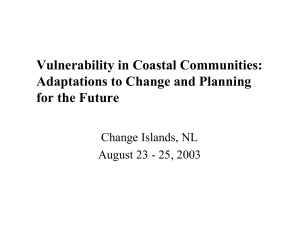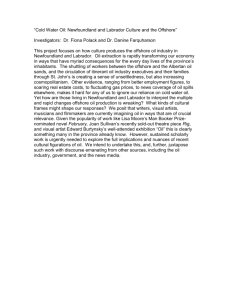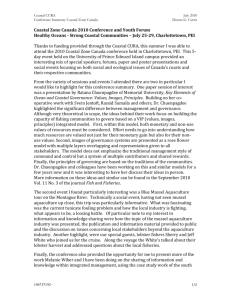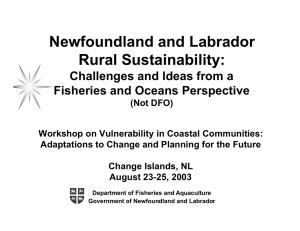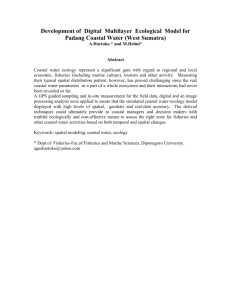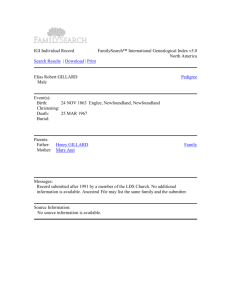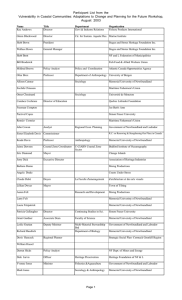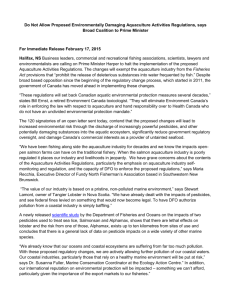THE FUTURE OF ENDANGERED COASTAL COMMUNITIES: BUILDING CAPACITY FOR RENEWAL
advertisement
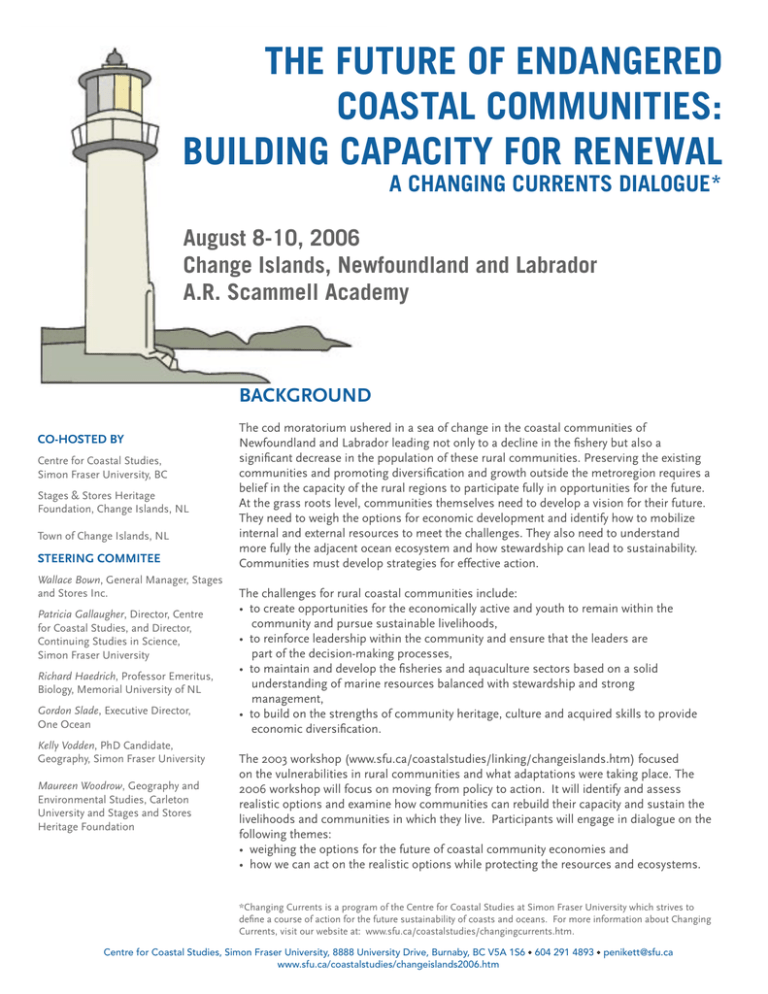
THE FUTURE OF ENDANGERED COASTAL COMMUNITIES: BUILDING CAPACITY FOR RENEWAL A CHANGING CURRENTS DIALOGUE* August 8-10, 2006 Change Islands, Newfoundland and Labrador A.R. Scammell Academy BACKGROUND CO-HOSTED BY Centre for Coastal Studies, Simon Fraser University, BC Stages & Stores Heritage Foundation, Change Islands, NL Town of Change Islands, NL STEERING COMMITEE Wallace Bown, General Manager, Stages and Stores Inc. Patricia Gallaugher, Director, Centre for Coastal Studies, and Director, Continuing Studies in Science, Simon Fraser University Richard Haedrich, Professor Emeritus, Biology, Memorial University of NL Gordon Slade, Executive Director, One Ocean Kelly Vodden, PhD Candidate, Geography, Simon Fraser University Maureen Woodrow, Geography and Environmental Studies, Carleton University and Stages and Stores Heritage Foundation The cod moratorium ushered in a sea of change in the coastal communities of Newfoundland and Labrador leading not only to a decline in the fishery but also a significant decrease in the population of these rural communities. Preserving the existing communities and promoting diversification and growth outside the metroregion requires a belief in the capacity of the rural regions to participate fully in opportunities for the future. At the grass roots level, communities themselves need to develop a vision for their future. They need to weigh the options for economic development and identify how to mobilize internal and external resources to meet the challenges. They also need to understand more fully the adjacent ocean ecosystem and how stewardship can lead to sustainability. Communities must develop strategies for effective action. The challenges for rural coastal communities include: • to create opportunities for the economically active and youth to remain within the community and pursue sustainable livelihoods, • to reinforce leadership within the community and ensure that the leaders are part of the decision-making processes, • to maintain and develop the fisheries and aquaculture sectors based on a solid understanding of marine resources balanced with stewardship and strong management, • to build on the strengths of community heritage, culture and acquired skills to provide economic diversification. The 2003 workshop (www.sfu.ca/coastalstudies/linking/changeislands.htm) focused on the vulnerabilities in rural communities and what adaptations were taking place. The 2006 workshop will focus on moving from policy to action. It will identify and assess realistic options and examine how communities can rebuild their capacity and sustain the livelihoods and communities in which they live. Participants will engage in dialogue on the following themes: • weighing the options for the future of coastal community economies and • how we can act on the realistic options while protecting the resources and ecosystems. *Changing Currents is a program of the Centre for Coastal Studies at Simon Fraser University which strives to define a course of action for the future sustainability of coasts and oceans. For more information about Changing Currents, visit our website at: www.sfu.ca/coastalstudies/changingcurrents.htm. Centre for Coastal Studies, Simon Fraser University, 8888 University Drive, Burnaby, BC V5A 1S6 ◆ 604 291 4893 ◆ penikett@sfu.ca www.sfu.ca/coastalstudies/changeislands2006.htm 1 PROGRAM AT A GLANCE Tuesday, August 8, 2006 3:00 – 6:00 Registration Arthur Scammell Academy 6:00 Dinner and Guest Speaker Society of United Fishermen’s Hall Dialogue Clusters: How can coastal communities be viable? Wednesday, August 9, 2006 Weighing the options for the future of coastal community economies 9:00 Opening Arthur Scammell Academy 9:30 – 12:30 Fisheries and Aquaculture 9:30 Plenary Presentation 10:00 Panel - Is the fishery a viable option for the future? 11:00 Break 11:30 Panel - Is aquaculture an option? 12:30 - 1:30 Lunch and Presentation: 1:30 - 5:00 What other options exist? 1:30 Plenary Presentation - 1:45 Panel 2:45 Break 3:00 Dialogue Clusters - Small group discussion and plenary report back 6:00 Dinner and Presentation: 8:00 Concert (by donation) The Split Peas 2 Thursday, August 10, 2006 How can we move forward and act on the realistic options while ensuring sustainable use of resources and ecosystems? 8:30 Recap of yesterday’s discussion. Arthur Scammell Academy 8:45 Plenary Presentation 9:15 – 10:30 Science Perspective 10:30 Break 10:45 – 12:00 Industry Perspective 12:00 - 1:00 Lunch and Presentation: 1:00 - 2:15 Community Perspective 2:15 - 3:30 Institutional Perspective 3:30 Break 3:45 -4:30 Wrap Up 4:30 Closing 6:00 Dinner (on own) Burgundy Squid, Seven Oakes, TLP Restaurant 7:30 Special Presentation Arthur Scammell Academy My Ancestors Were Rogues and Murderers Convenors Patricia Gallaugher, Director, Centre for Coastal Studies, Simon Fraser University, Burnaby, BC Notes Maureen Woodrow, Geography and Environmental Studies, Carleton University and Stages and Stores Heritage Foundation Inc., Change Islands, NL Facilitators Rob Greenwood, Director, Leslie Harris Centre of Regional Policy and Development, Memorial University, St. John’s, NL Kelly Vodden, PhD Candidate, Geography, Simon Fraser University, Centreville, NL Maureen Woodrow, Stages and Stores Heritage Foundation, Change Islands, NL Tuesday, August 8, 2006 3:00 – 6:00 pm Registration Arthur Scammell Academy 6:00 pm Dinner Society of United Fishermen’s Hall Opening and Welcome Patricia Gallaugher, Director, Centre for Coastal Studies, Simon Fraser University, Burnaby, BC Maureen Woodrow, Geography and Environmental Studies, Carleton University and Stages and Stores Heritage Foundation Inc., Change Islands, NL Guest Speaker The Honourable Loyola Hearn, Minister of Fisheries and Oceans Canada, Ottawa, ON Dialogue Clusters Participants will address the following questions in small working groups How can Coastal Communities be Viable? What changes are needed? What are the obstacles/resisters and challenges to effecting change? What are the enablers of change? What are the feasible time scales for change? 3 Notes Wednesday, August 9, 2006 Weighing the Options for the Future of Coastal Community Economies 9:00 am Opening Arthur Scammell Academy The Honourable Tom Rideout, Newfoundland and Labrador Minister of Fisheries & Aquaculture, St. John’s, NL 9:30 am – 12:15 pm Fisheries and Aquaculture Facilitator: Rob Greenwood 9:30 am Plenary Presentation A sustainable future for small coastal communities David Thomson, International Consultant, former fisherman, past lecturer (College of Fisheries in Newfoundland), Aberdeen, Scotland 10:00 am Dialogue Circle Panelists will address the following questions: Is the Fishery a Viable Option for the Future? What species? Where? How healthy are the stocks? How can we have a sustainable fishery? What types of employment might be associated with this? Will there be a workforce available? Panelists Glen Blackwood, Executive Director, Marine Institute, Memorial University of Newfoundland, St. John’s, NL Bill Broderick, Director, Inshore Sector, Fish, Food and Allied Workers Barb Neis, Professor, Sociology, Memorial University of Newfoundland, St. John’s, NL Kevin Anderson, Staff Officer, Regional Treaty Negotiations and Implementation, Resource Management Division, Fisheries and Oceans Canada, St. John’s, NL Mike Warren, Executive Director, Policy and Planning Newfoundland and Labrador Department of Fisheries and Aquaculture, St. John’s, NL 4 General Discussion 11:00 am Break Notes 11:30 am Dialogue Circle Panelists will address the following questions: Is Aquaculture an Option? How can we proceed with aquaculture and still protect the wild stocks? What species? Where? Is it economically viable and how should start-up be financed? Who will take the lead and assume the risk? Are there real economically viable success stories that we can point to in NL? Panelists Brian Meaney, Assistant Deputy Minister, Government of NL Department of Aquaculture and Fisheries Cyr Couturier, President and Interim Director, Newfoundland Aquaculture Industry Association, St. John’s NL Jill Bennett, Executive Director, Kittiwake Economic Development Corporation, Gander, NL Geoff Perry, Regional Aquaculture Coordinator, Planning and Coordination Division, Fisheries and Oceans Canada, St. John’s, NL Ian Fleming, Director, Ocean Sciences Centre, Memorial University of Newfoundland, St. John’s, NL General Discussion 12:30 pm Lunch Special Presentation Roasted Minke Whale with Cranberries: Challenges to environmentalism in conserving diversity of life and the diversity of human cultures Introduction: Anne Troake, Filmmaker, Twillingate, NL Presentation: Terry Glavin, Fisheries Writer/Researcher and Marine Conservation Advisor, Sierra Club of Canada, BC Chapter 1:30 – 5:00 pm What Other Options Exist? Facilitator: Maureen Woodrow 1:30 pm How do you diversify to enable a sustainable community? Centreville as a case study. Shane Noble, New Wood Manufacturers Inc., Centreville, NL 5 Notes 1:45 pm Dialogue Circle Panelists will address the following questions: What are other feasible industries for Newfoundland and Labrador? What are the enablers of new industry start-ups? Do these other options conflict with or complement the fishery and aquaculture sectors? What are the challenges and how do we overcome them? How do we ensure long-term sustainability? Panelists Juanita Keel-Ryan, Director, Tourism Product Development, NL Department of Tourism, Culture and Recreation, St. John’s, NL Mervin Wiseman, President, NL Federation of Agriculture; President, NL Fur Breeders’ Association and Director, NL Livestock Council, North Harbour, NL Todd Wight, Executive Director, Newfoundland and Labrador Outfitters’ Association, Deer Lake, NL Greg MacLeod, Director, Tompkins Institute for Human Values and Technology, Cape Breton University, Sydney, NS General Discussion 2:45 pm Break 3:00 – 5:00 pm Dialogue Clusters Participants will rotate at special topic tables to identify key points and recommendations for actions. Report out in plenary. 6:00 pm Dinner Special Presentation Resource Conservation in Costa Rica Introduction: Arlo Hemphill, Director, Global Marine Strategies, Conservation International, Washington, DC Guest Speaker: Antonio Arreaga-Valdes, Consul General, Consulado General de Costa Rica, Vancouver, BC 8:00 pm Concert (by donation) The Split Peas 6 Thursday, August 10, 2006 Notes How can we move forward and act on the realistic options while ensuring sustainable use of resources and ecosystems? Facilitator: Rob Greenwood 8:30 am Recap of the realistic options from yesterday’s discussions Arthur Scammell Academy 8:45 am Plenary Presentation The Enabling Conditions for Ecosystem Governance Stephen Olsen, Director, Coastal Resources Center, Metcalf Institute for Marine and Environmental Reporting, University of Rhode Island, Narragansett, RI, USA 9:15 am Dialogue Circle on Science Perspective Panelists will address the following questions: What is the appropriate level of integration of science into decision-making on economic development? How can local knowledge be incorporated into decision-making? How can ecosystem-based management be incorporated into decisionmaking at the level of resource use? How can we bridge the interests of politics (short term - election cycle), economic and science (long term over generations) to ensure sustainable use of resources? Panelists Krista Baker, PhD Candidate, Ocean Sciences Centre, Memorial University of Newfoundland, St. John’s, NL Sue Nichols, Professor, Geodesy and Geomatics Engineering, University of New Brunswick, Fredericton, NB Ben Davis, Acting Division Manager, Environmental Science, Fisheries and Oceans Canada, St. John’s, NL Shane Mahoney, Executive Director, Science Division - St. John’s Area Wildlife, Department of Environment and Conservation, Government of Newfoundland and Labrador Joe Wroblewski, Professor, Ocean Sciences Centre, Memorial University of Newfoundland, St. John’s, NL General Discussion 10: 30 am Break 7 Notes 10:45 am Dialogue Circle on Industry Perspective Panelists will address the following questions: What are the critical information needs of industry? What steps are being taken to ensure sustainable business practices? What potential partnerships and collaborations does industry envisage in order to implement needed changes? How does industry maintain and enhance infrastructure in coastal communities with a shrinking work force? What models of management does industry think are needed so that their needs, community needs and ecosystem needs are met? Panelists Derek Butler, Executive Director, Association of Seafood Producers, St. John’s, NL Paul Torraville, Fogo Island Co-op, Seldom, Fogo Island, NL John Wickham, Director, Regional Economic Development, NL Department of Innovation, Trade and Rural Development, St. John’s, NL Shane Noble, New Wood Manufacturers Inc., Centreville, NL Herb Bown, Stages and Stores Foundation, Change Islands, NL Beverley Stevens, Change Islands Newfoundland Pony Refuge, Change Islands, NL General Discussion 12:00 pm Lunch Presentation - More Bathrooms than Children: The Impact of Population Change Alison Earle, Assistant Deputy Minister, Rural Secretariat, Government of NL 1:00 pm Facilitator: Kelly Vodden Dialogue Circle on Community Perspective Panelists will address the following questions: What is the appropriate role for communities in management of adjacent resources? Who are the key players in the community who can facilitate change? How can we encourage people to get involved? How do we support and maintain their involvement given the tasks and frustrations? How can community structures be modified/utilized to effect change? How can communities coordinate efforts with other communities to achieve common goals on a larger scale? 8 What mechanisms need to be in place to ensure the development of leadership within and among rural communities? Panelists Steve Plante, Professor, Social Sciences, University of Quebec at Rimouski, QC Notes Stan Tobin, Ship Cove, Placentia Bay, NL Representative, Federation of Municipalities, St. John’s, NL Freeman Compton, Fogo Island Development Association, Fogo Island, NL Bernice Diamond, Acting Mayor, Change Islands, NL General Discussion 2:15 pm Dialogue Circle on Institutional Perspective Panelists will address the following questions: What changes are needed to make current management institutions more responsive and effective? How do institutions engage communities? What does it take to get institutions to talk to one another? How can we reconcile the diverse and conflicting interests for sustainable development in rural communities? What can government do with the revenue generated from the oil and gas industry? Who are institutions accountable to and how should they be monitored and evaluated? Panelists Kevin Anderson, Staff Officer, Regional Treaty Negotiations and Implementation, Resource Management Division, Fisheries and Oceans Canada, St. John’s, NL Representative, Newfoundland and Labrador Department of Innovation, Trade and Rural Development, St. John’s, NL Gordon Slade, Executive Director, One Ocean, St. John’s, NL Bill Grandy, Community Economic Development Officer, Program Development and Delivery, Atlantic Canada Opportunities Agency, St. John’s, NL Zita Cobb, Frangipani Foundation, Fogo Island, NL General Discussion 3:30 pm Break 9 Notes 3:45 pm Wrap up Plenary discussion to address the following questions: What are the take home messages? What are the key issues? What are the key action items for the short term and long term to ensure viable coastal communities? 4:30 pm Closing 6:00 pm Dinner On your own at one of the following locations: Burgundy Squid, Seven Oakes, TLP Restaurant 7:30 pm Arthur Scammell Academy Special Presentation My Ancestors Were Rogues and Murderers by Anne Troake, Filmmaker, Twillingate, NL. Produced by the National Film Board of Canada 10 Notes Notes 11 Notes 12 Notes Notes Notes 13 SPONSORS Including program sponsors, travel sponsors and in-kind sponsors Atlantic Canada Opportunities Agency Cape Breton University, Tompkins Institute for Human Values and Technology Carleton University, Department of Geography and Environmental Studies Conservation International Fisheries and Oceans Canada Fogo Island Co-op Fogo Island Development Association Food Fish and Allied Workers Union Frangipani Foundation Government of Newfoundland and Labrador Department of Fisheries and Aquaculture Department of Innovation, Trade and Rural Development Department of Tourism, Culture and Recreation Rural Secretariat Grupo Latino-Americano de Exportadores (GRULEX) Kittiwake Economic Development Corporation Memorial University of Newfoundland Dean of Science The Leslie Harris Centre of Regional Policy and Development Ocean Sciences Centre National Film Board of Canada Newfoundland and Labrador Outfitters Association New Wood Manufacturers Inc. One Ocean Simon Fraser University Changing Currents and the Centre for Coastal Studies Stages and Stores Heritage Foundation Université du Québec a Rimouski University of New Brunswick, Department of Geodesy and Geomatics Engineering WWF-Canada 14
